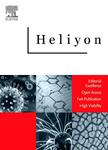版权所有:内蒙古大学图书馆 技术提供:维普资讯• 智图
内蒙古自治区呼和浩特市赛罕区大学西街235号 邮编: 010021

作者机构:Department of Electrical Engineering Dr B R Ambedkar National Institute of Technology Jalandhar Punjab 144011 India Department of Instrumentation and Control Engineering Dr B R Ambedkar National Institute of Technology Jalandhar Punjab 144011 India Department of Mechanical Engineering Dr B R Ambedkar National Institute of Technology Jalandhar Punjab 144011 India Department of CSE Shobhit University Gangoh India Information and Communication Engineering Yeungnam University Gyeongsan 38541 South Korea Universidad Europea del Atlántico Isabel Torres 21 Santander 39011 Spain Universidad Internacional Iberoamericana Campeche 24560 Mexico Universidade Internacional do Cuanza Bié Cuito Angola Universidad de La Romana La Romana Dominican Republic
出 版 物:《Heliyon》 (Heliyon)
年 卷 期:2025年第11卷第2期
页 面:e41653页
基 金:European University of Atlantic
主 题:Energy efficiency analysis Energy saving schemes Multi-effect evaporator Nonlinear constraint optimization Renewable thermal assistance
摘 要:This study emphasizes a multi-pronged approach to improving the energy efficiency of Multi-Effect Evaporator (MEE) in the paper industry. By incorporating traditional Energy-Saving Schemes (ESSs) and innovative renewable energy sources, the study demonstrates significant potential for reducing energy consumption and environmental impact, making it a decisive pathway for industrial sustainability. Key ESS strategies include Thermo-Vapor Compressors, Feed Preheaters, and Steam- and Feed-Split, which are employed to enhance Steam Economy (SE) to evaluate MEE efficiency. This integration results in a 67.93% enhancement in SE, reducing energy consumption significantly. Further, SE enhancement is achieved by integrating flash tanks that capture and reuse excess heat, which boosts SE by an additional 5.89%, leading to a total improvement of 73% without additional energy consumption. A significant innovation in the study is the integration of Linear Fresnel Reflectors (LFRs) based solar collectors and turbine-based wind energy sources to power the MEE and reduce reliance on conventional energy. This hybrid system decreases energy dependence by 62% for the base MEE and 34% for the hybrid MEE. The results are validated by comparing them with existing studies, confirming the effectiveness of the proposed method and offering significant energy and environment savings. © 2025